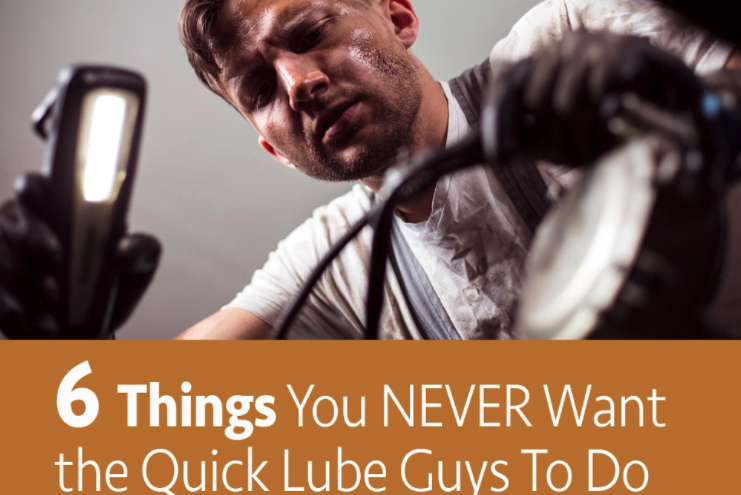It’s best and most cost-effective to change your own motor oil and filter, but if you need to stop in at a quick lube-type place, be prepared! It is frequently the case that while you are waiting in the lobby that the technician informs of you certain situation(s) with your car that you really should take care of now. But keep in mind: It is a situation designed to put pressure on you.
Lots of pressure.
They will tell you that your manufacturer recommends a particular service, and that you are overdue, right on it, or coming right up on it. These services typically focus on five high-profit, probably-not-needed services that they want you to pay for right now!
- Replace your cabin air filters
- High mileage oil
- Fuel system cleaning
- Brake fluid flush
- Transmission flush
- Transfer case or differential fluid change
Knowledge is power. So let’s take a deeper look at each high-pressure service.
1. Replace Your Cabin Air Filter
Don’t fall for this one. This is one of the most successful car repair scams on the market. It goes like this: The mechanic tells you that your air filter is filthy and shows you a dark, dirty filter. But is that YOUR filter? Some places keep a dirty filter on hand and try to make you think it’s yours and get your to buy a new one. Always make sure the filter you’re seeing is actually from your car! If you are convinced that it really is your filter, you’ll pay far too much for the filter they are selling you. You can buy filters on Amazon.com and watch a YouTube video to find out how easy they actually are to replace. You’ll save a ton.
2. Upgrade to “High Mileage” Oil
Quick lube places almost always recommend a High Mileage motor oil, which is supposed to provide better protection for your engine, and greater profits for the quick lube place. Auto experts say that simply starting with good quality synthetic motor oil will provide superior protection from the start, and that you never will need better oil as you get to higher mileage levels.
Use high-quality synthetic oil from the start. If you are driving a used car that you purchased, start using these same sorts of synthetic oils for maximum protection. You don’t need to pay for “high mileage” motor oil.
3. Clean the Fuel System Cleaning
It is true that over time, fuel injectors can get clogged up by deposits and residues in gasoline, and that certainly will have a negative effect on the combustion of the fuel. Yes, fuel systems need to be cleaned and while there are good fuel additives that you can add to a tank, those additives are not sufficient by themselves to keep the fuel system entirely clean.
Cleaning out the fuel system requires a special machine, a specific set of tools and an industrial-grade cleaner. These tools and cleaners are found in high-quality repair shops, but it is unlikely that a quick lube facility will have the specialized equipment necessary to do the job right.
Of course the quick-lube guy will insist that you need to get it done. But even if you really, really do, take it to a pro for a second opinion. Don’t get that work done at the quick lube.
4. Flush the Brake Fluid
Manufacturers generally do not recommend flushing the brake fluid as regular or semi-regular service. Flushing the brake fluid should be done if an inspection reveals that there is debris and rust in the master cylinder of the braking system – which indicated a broken seal or hydraulic cup.
A simple inspection of the brake fluid is all that you need. Brake fluid that is clear, sits, at the proper level in its reservoir, and does not smell burnt means you have a healthy braking system. If the color is black or rust-colored, there is a problem – but be aware that a simple flushing will not repair problem. If you encounter dark, rust-colored, or burnt-smelling brake fluid, get your car to a professional mechanic right away. Don’t trust it to the quick-lube guys.
5. Flush the Transmission Fluid
Read your owner’s manual to see if and when your manufacturer recommends flushing and replacing the transmission fluid and filter. Don’t take the quick-lube guy’s word on the subject.
There is simply too much to say here, so let’s jump right to the bottom line: Read your owner’s manual. But If you have a high mileage vehicle and the quick lube shop has recommended a fluid flush, get a second opinion from a drivetrain expert before proceeding…or you may pay the consequences.
6. Change the Fluid in the Transfer Case or Differential
Like the transmission fluid we just discussed, transfer cases are an area you don’t want to touch.
Different manufacturers use different fluids and each fluid is uniquely formulated for the respective transfer case application. There is just too much room for error when it comes to filling the unit with the wrong fluid. Never let a quick lube place touch your transfer case or differential. If you have any questions about either, talk to a drivetrain specialist or a dealership.
We’re happy to provide these tips for protecting your car, and your pocket book.
As insurance professionals, we can provide additional protection by making sure you have the proper coverages for your needs. Talk to us today about a quote for your auto(s).

